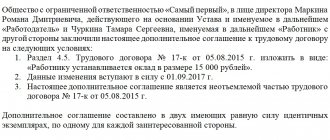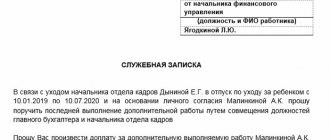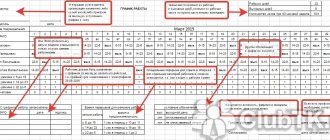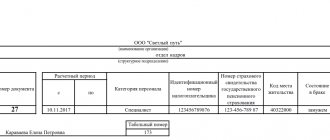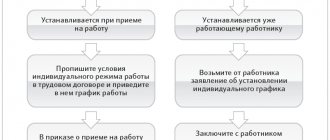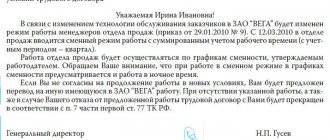Author: Ivan Ivanov
If it is necessary to change the work schedule for a certain group of employees or for the entire staff, you need to prepare an appropriate order. The need for such a change may arise:
- when changing the schedule in winter or summer;
- if it is necessary to optimize the organization’s work (for example, when a competitor appears in the territorial vicinity);
- when expanding or repurposing a production line, introducing new divisions and positions;
- when updating business technologies and equipment;
- to build an individual schedule for specific individuals (for reasons of illness, departure, employment, retraining, family circumstances).
Legislative regulation
Article 100 of the Labor Code regulates this issue and provides the following provisions:
- The length of the working week directly depends on the schedule (5/2, 6/1, flexible schedule, part-time).
- Working with uneven working hours affecting certain categories of employees.
- Length of a standard shift. Its time is calculated based on the start and end times of work, the number of shifts in one day, the time of all technological breaks and the sequence of working and vacation days.
The work schedule is fabricated and adjusted by the employer, without violating the thresholds prescribed by law.
The owner personally draws up a work schedule once and for a long time, but there are circumstances that oblige him to change the schedule.
The working hours can be adjusted or changed in accordance with articles , and 100 of the Labor Code of the Russian Federation, which address this issue.
Changing working hours
The working hours can be changed in two ways: either by agreement with the employee (Article 72 of the Labor Code of the Russian Federation), or by the employer unilaterally if there are appropriate grounds (Article 74 of the Labor Code of the Russian Federation).
So, in Art. 72 of the Labor Code of the Russian Federation establishes that changes to the terms of an employment contract determined by the parties are allowed only by agreement of the parties, concluded in writing. Exceptions to this rule are recorded in the Labor Code of the Russian Federation.
Accordingly, this method is applicable when the working hours condition is included in the employment contract, regardless of whether the employee’s RWP differs from what is established by the PVTR or not. What is decisive here is that the provision for RRR is included in the employment contract, even if it was not mandatory in accordance with Art. 57 Labor Code of the Russian Federation. But once included, such a condition becomes part of the employment contract.
In Art. 74 of the Labor Code of the Russian Federation refers to the possibility of unilateral changes in the terms of the employment contract by the employer if the organizational or technological working conditions change. The working hours may also be a condition of the employment contract, which the employer needs to change. Consequently, a change in the work permit must be justified by objective reasons that impede the preservation of previous working conditions, and should not affect the employee’s labor function.
But these methods of changing the working time regime - both by agreement of the parties to the employment contract, and unilaterally by the employer - refer to changing the terms of the employment contract. What if the working hours, as in the third paragraph of the previous section, are established not by the employment contract, but in the PVTR? Can an employer unilaterally change the PVTR, in particular, establish a new working time schedule, familiarizing employees with it against their signature? What to do if employees do not agree with the change in the PVTR? And if employees agree, how to record this?
In this case, you need to be guided by the following. PVTR are a local regulatory act and are adopted by the employer in agreement with the representative body of employees (Article 190 of the Labor Code of the Russian Federation). But we are considering the case when a representative body of workers has not been formed, i.e. absent. In such a situation, it is logical to conclude that the employer can independently adopt PVTR, including establishing working hours within their framework. When hired, employees are familiarized with the PVTR against their signature. But there is an urgent need to change the PVTR - to establish a new working hours for all or for a group of employees. Here we should apply the analogy and principle of equal opportunities for workers to exercise their rights, enshrined in Art. 3 Labor Code of the Russian Federation. So, if for those employees whose RVV is specified in the employment contract, a rule is established to change it only by agreement of the parties (Article 72 of the Labor Code of the Russian Federation) or by the employer unilaterally (Article 74 of the Labor Code of the Russian Federation) with the provision of certain guarantees, then these provisions should be applicable for those employees whose working hours are not specified in the employment contract, but are established in the PVTR. For them, working hours are no less important than for those for whom it differs from the general rules.
It follows that when changing the PVTR in relation to already working employees, one should either enter into a written agreement with them on their acceptance of the changes to the RRV introduced into the PVTR, or when unilaterally changing the PVTR regarding the RRV, act in accordance with Art. 74 Labor Code of the Russian Federation. As for newly hired employees, the new working hours will apply to them from the moment they are hired. Since, having become familiar with the Labor Rules, including the regulation of working hours, when registering an employment relationship, the employee agrees to such terms of the employment relationship or he has the opportunity to ask the employer to establish a different Labor Rule in the employment contract.
Next, we will consider the procedure for changing the working hours depending on the basis:
- changing the RV established by the employment contract by agreement of the parties;
- changing the RV established in the PVTR by agreement of the parties;
- changing the RRR established in the employment contract or in the PVTR, if employees do not agree (Article 74 of the Labor Code of the Russian Federation).
Basis for making changes to the mode
You cannot change your working hours without compelling reasons. Such grounds may be:
- The voluntary consent of the worker, expressed in the form of a letter, and accurately executed additional. agreement.
- An updated version of the internal labor regulations was adopted after personal negotiations. It should reflect technological or organizational changes in the company's working conditions.
The decision to change the working time regime is made only by the manager , with the exception of a few cases. If the boss intends to make changes to the document, without the obligatory agreement of the employee in writing, this cannot be done, relying on Article 72 of the Labor Code of the Russian Federation.
In another case, according to Article 190 of the Labor Code, the procedure for adopting internal regulations requires coordination of an updated work schedule with the trade union .
Violation of these charters may result in legal liability for the director.
Grounds for issuing an order
The document must indicate the legal provisions that made it possible to adjust the operating mode of the institution. Depending on the current situation, these could be:
| Normative base | Description |
| Art. 74 Labor Code of the Russian Federation | If the institution’s order refers specifically to this provision of the law, then the employer may not ask the employees’ consent to changes in working hours. This is due to the fact that there have been changes in production technology and working conditions. |
| Art. 72 Labor Code of the Russian Federation | This clause of the law can be referred to only in cases where adjustments were made after reaching a mutual agreement between the parties. |
In addition, if the company has an active trade union, all changes must be coordinated with this body, otherwise the enterprise and its manager will face administrative fines.
Employee Notification
All employees affected by the upcoming innovations must be made aware of the adjustments. Moreover, according to Article 74 of the Labor Code of the Russian Federation, no later than two months before the start of the new regime.
The employee either receives the notice in hand or listens to its provisions aloud if he refused to take it at the place of work. You can refuse the terms dictated in the notice. In this case, the employer is considered to have fulfilled his part of the obligation to promptly warn his subordinates.
If an employee refuses to perform his duties under the updated conditions, dismissal is possible by agreement of both parties .
Read this article about dismissal by agreement of the parties.
Sample notification to employees:
Change of regime at the initiative of the employee
It is possible to change the operating mode based on his request. The reasons can be very different, most often it is a changed lifestyle and lack of time for family matters and relatives. The director has the right to either approve the changes or reject them.
To document the new conditions, the employee must write a corresponding statement. It must contain the following information:
- Information about the head of the organization/company;
- Last name, first name and patronymic of the employee;
- Wording: “I ask you to change my working hours” followed by information about the current and new modes;
- Reason for schedule correction;
- Compiler's signature with transcript;
- Date of application;
- Additionally attached agreement indicating new opening hours.
Sample application for transfer of working hours at the initiative of the employee:
Changes in operating hours in the timesheet: how to reflect correctly?
NS or 25 – respectively, the letter and number designation of the part-time working mode. This is necessary to fill out forms No. T-12, or documents developed independently by the company’s management.
If a document is filled out incorrectly, it is subject to mandatory destruction. You will find the rules for this procedure and an example of an act on the destruction of documents in this publication.
If the work schedule is not full-time, then payment is made in proportion to the time worked.
Order to move
So far, the legislation has not prescribed a general standard for writing an order for the transition to a new regime. Managers, using minimal legal knowledge, write them arbitrarily. But there is still a list of information without which the order will not be valid:
- Locality;
- Document Number;
- Full name of the organization;
- The day, month and year in which the document was drawn up;
- The essence of the order, some provisions on the future working hours;
- The basis for drawing up the order;
- Information about the persons responsible for fulfilling the terms of the order, their ranks and full last name, first name and patronymic;
- Date and signature of the manager.
Sample order to change employee schedule:
The HR department should not have a question about how to formalize a change in an employee’s work schedule. The basis is an order from the head of the organization. According to it, a work schedule is formed, taking into account the new regime.
Both the employee and the manager can adjust the conditions. Based on the articles of the Labor Code of the Russian Federation, you can easily draw up a statement about changing the regime.
Watch the video about working hours:
Order to change the employee’s routine: content requirements
The order is issued on the company's letterhead. It must include the following details:
- Visas.
- Signature of the managers.
- The main part of the text.
- Title to the text.
- The number assigned to the document.
- Place of publication, date information.
- Document's name.
- The name of the enterprise itself.
Sometimes it is necessary to sign various papers for another person. An example of a power of attorney for the right to sign documents can be found at the link.
It is important to cover not only issues related to the new working conditions themselves. But also, for example, information on wages in connection with the changed schedule.
Features of documentation
The main requirement is that all employees be notified in advance that their working hours have changed . This is usually notified no later than two months before changes are made. This even applies to situations where the changes themselves are temporary.
If you decide to quit your job, you must write a statement. You can see an example of an application for voluntary resignation here.
The notification must also contain information about why the enterprise now needs to switch to this work schedule.
It is necessary to provide information about what rights and responsibilities each employee has in such a situation. And about the period within which the employee must give an answer, agree to such a regime, or refuse it.
The employer may offer other jobs to those who, for whatever reason, are not satisfied with the changes. Otherwise, the employment contract is terminated on a general basis.
An order to change the work schedule due to production needs.
